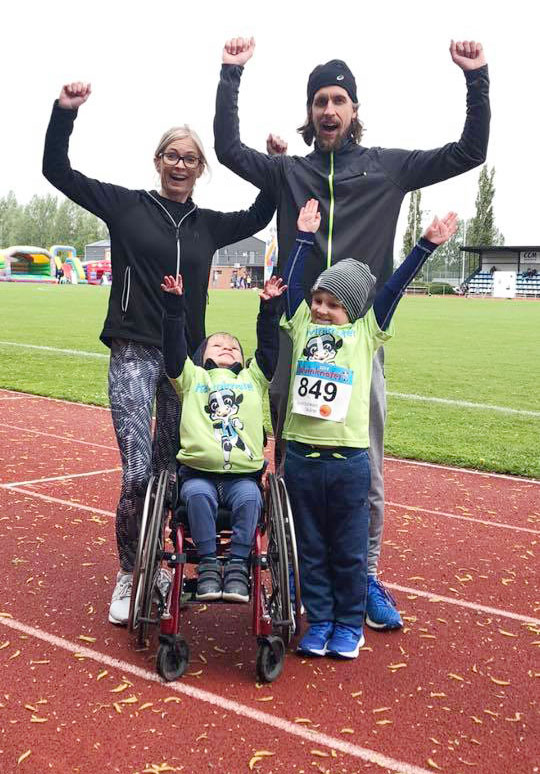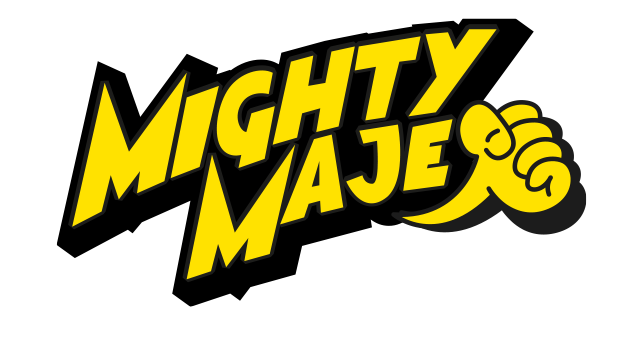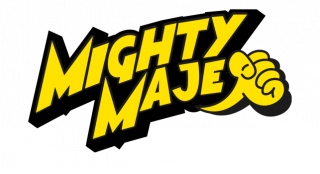First names mother/ father: Anna & Filip
Place of residence: We live in a house in a small village in southern Sweden
Name and age of the child: Hjalmar, 4 years
Exact diagnosis: LMNA-CMD
Siblings: Hugo, 6 years
When and how did you notice that your child was different? Do you remember your thoughts on this?
When we look back now there were signs when he was just a couple months old, but we didn’t see them then. He never learned to crawl, instead he developed a very skilled technique where he rolled around to get to where he wanted. When he sat on the floor it was always very unstable.
When he got to the age around 14-15 months he had not yet learned to walk. We saw a physiotherapist who gave us exercises and said that she thought he would walk soon. But months went by without any improvements. When he walked with holding on to us he was very unstable and the balance were floppy. Eventually we understood that something was not right and went to see a doctor. We didn’t though for one second thought it could be something related to a neuro muscular disease. Unclear why that didn’t crossed our minds, probably because before this you don’t know so much about these types of diseases.
When and how was the muscle disease diagnosed? What were your spontaneous thoughts?
The doctor we saw when he has not learned to walk sent us to a specialist who said that he believed that it was related to a neuro muscuar disease which came as a total chock. Our life turned upside down from one day to another. They first suspected SMA or Duchenne which later shown that it wasn’t. Then they started a genetical investigation for the whole family which after about 4 months shown that Hjalmar had a defect LMNA gene. The mutation was de novo, which means that none of us has it. He was diagnosed with LMNA-CMD and the exact gene mutation has only been registered twice before in the international database. So we are really talking about a very rare mutation.
The thoughts on this is hard to describe. It has been a total roller coaster since. It felt like we were thrown into a parallell world were everybody just moved on in the real world and we had to find our way of managing this new situation. Eventually you adapt to this new situation and even if it’s very challenging we also learned to appriciate things we didn’t noticed before.
To what extent is your child limited? And what tools does he or she use?
His muscle weakness makes it impossible for him to walk unassisted. He has a lot of tools helping him in the everyday life. He has a wheelchair and a walking chair. He also has an electric wheelchair which he likes very much. It gives him the independence that he usually don’t has. He also has a number of different other tools to manage different situation, one example is a feeding button to where he gets his food since he is not eating thorugh his mouth. I belive that Sweden is very good as a country to supply this kind of help. Everything is without cost and all tools that he needs are available for us.
How do you organize childcare? Do additional forces support you in everyday life?
Hjalmar is in pre school where he has a resource that helps him thorugh the day. We also has assistance in our home basically 24/7.
How do you as a family look into the future? What do you hope for from medical (genetic) research?
Right now we try to look at a narrow perspective and not look to much ahead. Currently there is no treatment for this, but who knows in the future. We can only hope for the best and that there someday will be a cure for this. The most important thing right now is that we give him the best tools to have a good life with as little limitations as possible.
We have a small organization called Team Superhjalle where we run for charity and arrange a race every year in benefit for research within CMD related diseases.
How does your child deal with its illness? Do you talk openly about the topic?
Until just recently he has not yet reflected or noticed so much difference. Now when he is 4 years old he starts to asks some questions about it. We try to be as open as possible and talk about with great honesty about the situation. We believe that this is the best way to handle it.
What does your child particularly enjoy doing?
He loves to play of course with different things. He is extremely social and active and has a very strong will which is his best strength, coping with his disease There is not one thing that he believe he cannot do which is a very good way to handle this.
What do you wish for your child?
Of course we wish that there someday will be a cure or treatment that can make this disease go away or at least make it better. But we also wish that we can give him a strong personality so he can grow up manage this situation as good as possible and that he can find things to appreciate where he is not limited by his muscle weakness.
Thank you, Anna & Flip. More interviews will follow.
